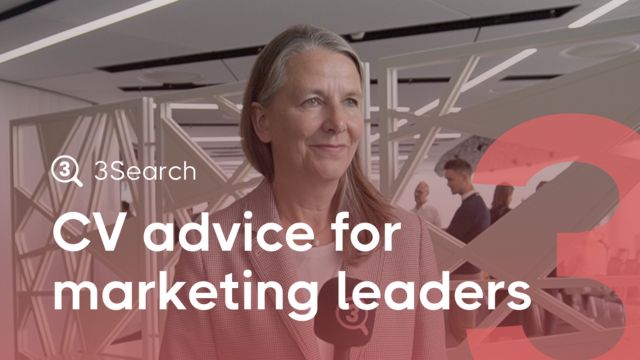
Upload Your CV
Send us your CV and a member of the team will be in touch to discuss open opportunities with you.
Congratulations! All of your hard work over the past three years (or three months, depending...

Congratulations! All of your hard work over the past three years (or three months, depending on your work ethic) has finally paid off and you’ve earned your degree. But now it’s time for the hard part: finding a job.
With tens of thousands of other students about to complete their degrees, all of them in the same boat as you, the graduate jobs market is about to get crowded. Very crowded.
According to research published in The Guardian the average graduate spends six months searching before finally securing their first full time job. The next few months are going to be a stressful but fortunately there are ways to make the process a little easier. Here are 3Search’s four quick tips for boosting your chances of landing a job in marketing after you graduate.
On average, recruiters spend just 6 seconds looking at each CV; so it’s vital that your CV maximises your chances of getting through this filtering stage.
For entry-level positions, recruiters know that you’re unlikely to have tonnes of prior experience so consider majoring on the skills that you have developed through internships, volunteer positions and via your degree. Marketers are looking to see that you can write coherently, have an eye for design and have a decent understanding of the latest trends in the sector, plus the personality, drive and passion to succeed.
Your only previous employment was behind the bar in the student’s union or in a city centre shoe shop? Don’t worry – almost every job will have given you some of the skills necessary to be a great marketer.
Don’t just list your responsibilities – no one is interested that you changed barrels or cashed up the till. Focus on relevant accomplishments instead: did you sell more than anyone else? Did you design the poster for that highly successful night? Were you the genius behind that campaign to sign up players to the lacrosse team?
A large percentage of other applicants will have similar work experience to you, so state why your application is better than the rest. It is also important to give your CV some direction using a profile section, and potentially a key skills section. Ensure that both sections are very clear and focused towards each job you’re applying for, using key words mentioned in the job description.
With such extreme time constraints, writing a job winning CV in a clear and concise format will help the recruiter find your relevant and pertinent information resulting in the best chance for you to get hired.
To maximise your chances of getting a job you need to be getting your CV in front of firms early and often. Start your job search as soon as you can (if you haven’t started yet, what are you waiting for? Get on it!). Many graduate schemes will be recruiting for a September start, but you can still get ahead for the roles starting in January, so get looking at these. Don’t feel like a grad scheme is the only way into a big business. Lots of firms recruit all year round so make sure you aren’t just looking for that next big graduate scheme opportunity. Other ways of being proactive are to talk to careers advisers, refine your CV and start on building your online presence. This entails following your favoured employers, reading blogs about the marketing industry and contributing to the online forums (e.g. the UK Marketing Network’s Forum).
To help elevate your chances further, sign up with recruitment agencies. For graduate-level jobs this should include both the larger agencies, and specialist sector-specific recruiters like 3Search. Once you’re signed up the consultants will be able to offer advice on your CV, help you find temporary placements, as well as access several of the top roles prior to the mainstream job boards.
What you look like to potential employers is a big deal. A recent survey found that practically all recruiters (94%) are using social media during their hiring processes.
The majority of employers will check your online profiles, with the go-to business based social media network being LinkedIn. You have the potential to make some powerful contacts via LinkedIn, so if you don’t have an account, go and create one now.
Your LinkedIn profile should not be a direct copy of your CV, but should contain greater detail about your previous roles and things you’ve done; maybe even explain what the factors were behind your decision to choose your degree subject and previous jobs. It’s a chance for you to show your individuality online!
Twitter is a further medium that recruiters use to advertise, find and research potential employees. Bearing this in mind, try and keep the tweets you send from your personal account as professional as possible – be careful what jokes, pictures and potentially inappropriate content you post.
Include a short plug about your career ambitions in your bio so you can be found in any searches, and do take part in the online discussions and chats. This will help show any potential recruiters you do actually have a genuine interest, and are backing up your words with actions.
Facebook isn’t widely used by recruiters. Make sure that your privacy settings are secure so that those personal photos from Uni and travelling don’t prevent you from getting your dream graduate job!
Yes, you’re going to go online and see loads of exciting looking jobs paying £35k plus. Realistically, these are for candidates with two to three years of experience under their belts – so don’t just spam recruiters with your CV without carefully checking out how you match up to their required skills and experience. The result will only be an inbox clogged with “we regret to inform you…” emails.
Read through the employer’s requirements carefully and try to link your experiences to their requirements. Identify where there are gaps and consider taking some free online courses to boost your skills (perhaps in Google Analytics or the latest digital marketing techniques). Employers will likely be impressed with your proactive attitude.
Remember that there are two levels to the job market: visible and concealed. The visible market refers to jobs that are promoted and advertised across all mediums, and are therefore highly competitive.
The concealed job market is where jobs arise through other methods such as word-of-mouth, networking, or through the use of recruitment agencies. As many as 60% of jobs are never publicly advertised, so personal networking (via LinkedIn for example) and the use of a sector-specialist recruitment agencies with lots of contacts and know-how is crucial. Hopefully you will find that by applying these tips you will be able to improve your own job-hunting situation. Once you’ve written your CV, why not apply for one of the many marketing, communications and digital jobs currently on the 3Search jobs page? Also, connect with us via LinkedIn, Twitter and Facebook to keep up to date with all of our new jobs and blogs.